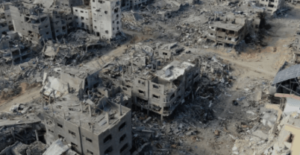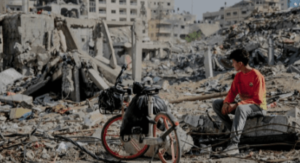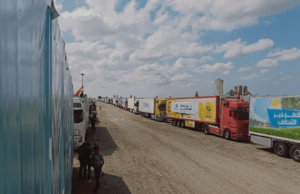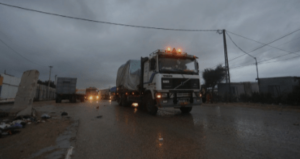Ceasefire attempts are unacceptable for Hamas
Airstrikes across Gaza resumed on Tuesday, despite ongoing peace talks in Cairo to reach a ceasefire between Israel and Palestine. More than half a year into the Gaza war, Hamas has refused yet another ceasefire negotiation, citing Israel’s failure to respond to its demands of withdrawing all IDF (Israeli Defence Forces) personnel from Gaza.

The recent truce was drawn up in collaboration between U.S., Qatari, and Egyptian mediators, and under the suggested parameters, there would be a ceasefire lasting six weeks. About 40 civilian hostages (likely women and children) would be released in exchange for hundreds of Palestinian prisoners.
Hamas leader Ismail Haniyeh also suggested that up to 500 aid trucks would be allowed to enter the Gaza Strip every day under the proposed truce. He further added that, despite admiring the efforts of mediators to draw up plans for a ceasefire, Hamas won’t agree to any ceasefire with Israel unless all forces are withdrawn from the Gaza strip.
The Israeli Supreme Court had previously ordered PM Netanyahu’s government to prove, in meaningful ways, that the IDF is not limiting aid entering Gaza.
Global organisations and world leaders have repeatedly accused Israel of imposing strict restrictions on the entry of aid trucks into Gaza, despite Israel’s rejection of such allegations time and again.
Hamas insurgents still hold many Israelis’ hostages
The deadly October 7 attacks by Hamas resulted in the deaths of over 1,170 people and over 250 Israeli civilians taken hostage by the terror outfit.
Over 129 of the hostages are still in Gaza. Although the IDF estimates that approximately 34 civilian hostages have been killed so far, following Israel’s counteroffensive into Gaza.

According to the Hamas-run Health Ministry’s latest estimates, over 33,360 Palestinian civilians have been killed so far, with an estimated damage to 88,868 buildings in the Gaza Strip, as a direct result of Israeli airstrikes.
Amid the war, PM Benjamin Netanyahu has faced repeated calls for stopping the conflict from claiming more lives. Following a phone call from U.S. President Joe Biden last week, Netanyahu opened up the Erez border crossing, linking Israel and Northern Gaza, to better facilitate the entry of aid trucks into Gaza.
As of Tuesday, PM Netanyahu has assured the military that the planned invasion of Rafah will carry on as usual at an unspecified time and date, despite repeated calls from global leaders and organisations to stop the war. He reportedly said, “No power in the world will be able to stop us”, indicating his stern decision to finish off Hamas, at any cost.
U.S Secretary of State, Anthony Blinken has said that Israel has not notified the U.S about the specifics of Rafah invasion.
The city of Rafah is currently sheltering over 1.4 million Palestinian refugees who have been pushed out of Gaza due to the IDF’s relentless air and ground offensive.
State Department spokesperson Matthew Miller said, “We have made it clear to Israel that we think a full-scale military invasion of Rafah would have an enormously harmful effect on those civilians and that it would ultimately hurt Israel’s security.”
On the other side, Israel continued its ground and air offensive into Gaza as of Tuesday, with IDF sources claiming to have eliminated a terrorist in the city of Khan Yunis, responsible for the October 7 attacks.

IDF further added, “In the central Gaza strip, IDF troops eliminated a number of terrorists in close-quarter combat, with several additional terrorists eliminated by precision air-strikes and sniper fire.”
Hamas claims Israel has weaponised Hunger
PM Benjamin Netanyahu has found himself increasingly distanced from global politics due to his unwillingness to end the ongoing conflict. In recent times, the global outcry over Israel’s offensive has only increased, with international pressure mounting from nations like France, Jordan, Egypt, and even Israel’s closest ally, the U.S.
On Monday, Israeli defence ministry body COGAT (Coordination of Government Activities in the Territories) said 419 aid trucks were allowed into Gaza, a record number since the beginning of the conflict.

Spokesperson for the United Nations’ Humanitarian Agency, Jens Laerke, told journalists in a recent meeting in Geneva that “the figures provided by Israel on aid distribution are meaningless, as screening rules, delays at crossings, and stringent restrictions on drivers crossing the border delay the aid distribution efforts even further.
UNWRA (United Nations Relief and Works Agency for Palestinian Refugees in the East) estimates nearly 1.2 million people in northern Gaza are famine-stricken, with hundreds of reports of death by starvation.

He also added that, from the previous estimates, it is clear that Israel imposed three times more restrictions on food-aid trucks than any other aid convoy.
Israel has repeatedly denied those claims, saying aid organisations are not distributing enough aid in the first place, although the international community has also accused Israel of carrying out airstrikes on aid efforts as well, both knowingly and unknowingly.












Comments 1